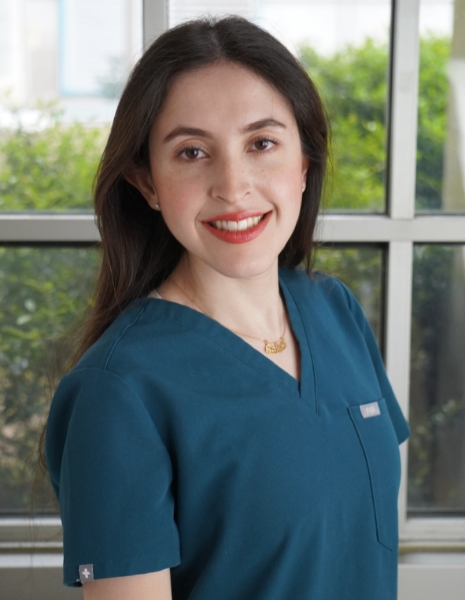
“The 15-year-old me never expected to be in Alabama 15 or so years down the line,” Ahmad says with a laugh. “But here we are.”
In this case, “here” is the University of Alabama at Birmingham (UAB) School of Dentistry (SOD), where Ahmad is a third-year student taking part in the International Dentist Program (IDP). Ahmad already has a Bachelor’s degree in Dentistry that she received from King’s College London in 2013. But after 5½ years of practicing dentistry in the United Kingdom, Ahmad moved to the United States in 2019 when she got married and began working toward receiving a D.M.D degree in the U.S.
“It’s quite interesting coming back as a student,” Ahmad says. “Obviously, my cohort in the IDP are all foreign-trained, but it’s been great to see that there are a lot of foreign-trained dentists in the faculty here as well. They are very open to learning about dentistry in the wider world.”
When she wasn’t reading famous works of literature, Ahmad says she most enjoyed science and math classes. So when it came time to choose a potential profession, Ahmad says she considered both engineering and medicine before settling on dentistry.
“It’s sort of a hybrid, where you can see patients and treat disease, but still incorporate some elements of physics and mechanics into it,” Ahmad says. “I also like that you get to see people over and over again, usually at least once every six months. You don’t just treat somebody once and then they’re gone. You get to know your patients well and gain these relationships. It’s a very caring profession.”
That type of personal connection also is one of the things that attracted Ahmad to joining the UAB SOD. She says she quickly felt comfortable during the interview process, and shortly after arriving her peers voted her president of the IDP Class of 2025.
“The people who interviewed me for the (IDP) program, I could feel that they wanted me to come here,” she says. “That was one of the main reasons I chose UAB, was that welcoming feeling. I knew I wasn’t just going to be lost in the crowd as a number.”
In fact, instead of being lost in the crowd, Ahmad has discovered that she and her fellow students often are front and center when it comes to working with patients in the school’s Comprehensive Care Clinic.
“One thing that really helped me choose UAB is the fact we get a lot of clinical experience,” Ahmad says. “Because ultimately, to become a good dentist, you need experience. It makes us more efficient and independent clinicians. That’s really important, so we can problem-solve.”
“It also helps that we serve such a huge community, and not just local Birmingham. We see urban populations and rural populations and everything in between. And it’s a community diverse in age, ethnicity and cultural. So we get a really good range of experience.”
Upon her scheduled graduation from the SOD in June of 2025, Ahmad says she might pursue a postdoctoral program, either the General Practice Residency or the Advanced Education in General Dentistry.
“They’re a good steppingstone to learn more complex procedures and manage more complicated medical histories,” Ahmad says. “I did a year of that in the UK. That one year alone taught me a lot about how to work under pressure. Because people would come in with big infections or lacerations, including children. I learned a lot of my clinical skills and patient management in that year, and how to keep cool and calm when people around you are stressed out.”
But most of all, Ahmad says she simply wants to care for her patients and help spread the word on the importance of oral hygiene to disease management and overall health.
“The mouth is always in use, but people almost take it for granted,” Ahmad says. “People sometimes disassociate the mouth and teeth from the rest of the body. I want to help teach patients that this is all interconnected. General health will affect the mouth, and the mouth and teeth will affect the rest of the body. Everything is interlinked when it comes to health.”
Learn more about Ahmad by watching her featured interview in this International Dentist Program informational video: